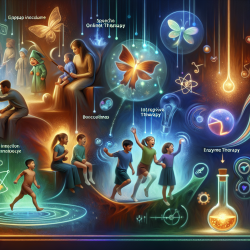Introduction
As practitioners in the field of speech-language pathology, we are continually seeking ways to enhance our interventions and improve outcomes for children. One promising avenue is the consideration of multigenerational influences, as highlighted in Robert D. Mare's research, "A Multigenerational View of Inequality." This blog will explore how insights from this research can be applied to our practice, encouraging practitioners to consider broader familial influences and potentially conduct further research.
The Multigenerational Perspective
Mare's research challenges the traditional two-generation model, which focuses solely on parent-child interactions. Instead, it emphasizes the importance of considering influences from grandparents and other extended family members. This multigenerational perspective is crucial because it acknowledges the broader social and economic contexts that affect a child's development and opportunities.
Implications for Speech Therapy
Understanding multigenerational influences can significantly impact how we approach speech therapy. Here are some key considerations:
- Family Dynamics: Recognizing the role of grandparents and extended family can provide a more comprehensive understanding of a child's communication environment. This can inform more tailored and effective intervention strategies.
- Socioeconomic Context: Multigenerational socioeconomic factors can influence access to resources and support systems. Awareness of these factors can help practitioners advocate for necessary resources and support for families.
- Longitudinal Impact: Considering the long-term effects of multigenerational influences can help practitioners set realistic goals and expectations for therapy outcomes, acknowledging that changes may be gradual and influenced by broader familial contexts.
Encouraging Further Research
While the multigenerational perspective offers valuable insights, it also highlights the need for further research in this area. Practitioners are encouraged to explore the following research avenues:
- Investigating the specific roles of grandparents and extended family in supporting speech and language development.
- Examining how socioeconomic factors across generations impact access to and effectiveness of speech therapy.
- Developing models that integrate multigenerational influences into speech therapy practices and outcomes.
Conclusion
Incorporating a multigenerational perspective into speech therapy practice can lead to more holistic and effective interventions. By considering the broader familial and socioeconomic contexts, practitioners can better support children in achieving their communication goals. To delve deeper into the research underpinning these insights, I encourage you to read the original research paper, A Multigenerational View of Inequality.










